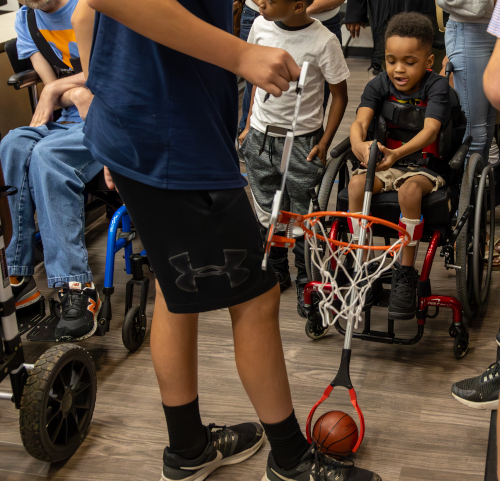JACKSON, Tenn. — May 17, 2024 — A gunshot wound left 5-year-old Noah Shaw paralyzed from his chest down. He uses a wheelchair, and he still loves to play.
But sometimes he drops a ball or a toy, or he needs to pick up something else that’s out of his reach. That’s where a team of local middle and high school students and their Union University student mentors stepped in.
As part of the annual Make:able challenge, a team of middle school students designed and produced a set of “grabbers” for Noah, allowing him to operate more independently by picking things up without the help of anyone. The teams presented their projects May 10 during a year-end celebration in Union’s Harvey Auditorium.
“Noah loves the grabbers,” his grandmother, Michelle Shaw, said. “These are the best things they could have done for him. The grabbers have really enhanced Noah’s capabilities.”
The project for Noah was one of eight completed at Union University this year by 29 middle school and high school students through Make:able, a worldwide 3D printing and assistive technology design challenge. Georg Pingen, professor of engineering at Union, said PrintLab, a United Kingdom-based company, began the competition four years ago. He brought Union on board three years ago.
“Overall, the project fits in very well with our mission as a department, with Union’s mission and with the sort of things our students like to do,” Pingen said. “They like to use engineering in a way that helps other people.”
Union’s engineering department holds a 3D printing workshop every other Friday evening for local middle school and high school students, and Pingen saw Make:able as an opportunity to challenge the students by providing them with real-world design experiences that could also help members of the community. Union partners with West Tennessee Healthcare’s Therapy and Learning Center to identify local residents in need of assistive technology to help improve their lives.
“I don’t know if I would have believed what difference a group of middle school kids can make in the life of a community member,” Pingen said. “But it’s been really nice to watch them put their skills to use to help someone in our community.”
Pingen uses Union engineering students as mentors for the teams, giving them opportunities outside the classroom to use and develop their skills.
“It’s been nice to see how those Union students take ownership of those teams,” he said. “They really mentor those projects. Their goal is not to do the projects, but to enable the middle and high school students to make their ideas come alive.”
Stacia Talbott, a Union sophomore mechanical engineering major, helped mentor a team of four girls who worked with a girl who has cerebral palsy. They developed some items to help her with everyday life – pencil grips, an Uno card holder – in addition to a chair with a tray where she can comfortably sit, play video games and do homework.
“I thought it was such an amazing concept, to be able to help out people in the community who are disabled and be able to engineer them some products that can help them with their daily lives or help them have more fun,” Talbott said.
One team worked with Kristen Daniel, an 18-year-old who was in a car accident and who uses a wheelchair. Because of brain damage she sustained, she doesn’t have good control of her left hand, which is stuck in a fisted position.
The student team used a 3D scanner to make a clay model of her hand in an open position. They turned that scan into a 3D model they used to create a device that helps Daniel’s therapist work with her in a way that is less painful and that allows her to practice weight-bearing activities.
“It took a lot of trial and error,” said Greyson Heit, a senior at Faith Tutorial and a dual enrollment student at Union. “That was probably the hardest part of the project, just coming up with that initial idea.”
Bobby Perry, a Union sophomore mechanical engineering major, participated in Make:able as a high school student at Jackson Christian School and served as a mentor this year.
“I really like being able to mentor younger people and help them see their skills that they didn’t know they had, or help them build on the ones they already knew,” he said. “I think it’s fun to see the things you can do with the skills you have to actually help people.”
Video summaries of all the projects are available at www.teachme3dp.com/makeable24.

